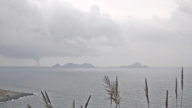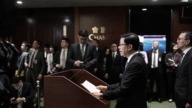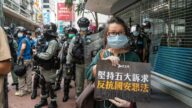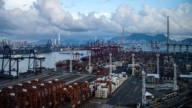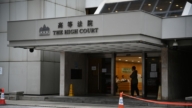【新唐人2011年8月9日訊】與香港毗鄰的深圳,上個世紀50年代至70年代中共建政初期,數百萬居民,由深圳越境逃往香港。「大逃港」是中共建政以來首次成功的最大規模民眾維權行動。原《深圳特區報》記者,《大逃港》一書的作者陳秉安,上個月在香港揭開了百萬民眾大逃港的血淚史。一起來了解這段大陸民眾悲慘可泣的逃港故事。
與香港毗鄰的深圳寶安,早年曾經流傳著這樣一首民謠:「寶安只有三件寶,蒼蠅、蚊子、沙井蠔。十屋九空逃香港,家裏只剩老和小。」從1955年開始,深圳總共出現過4次大規模的逃港潮,參與者涉及廣東、湖南、湖北、江西、廣西等全國12個省、62個市 (縣)。
《大逃港》作者陳秉安7月23號在香港書展,以「香港人的集體回憶─探索50至70年代的偷渡潮與逃港故事」為題,發表演講。他表示,逃港者中有農民、城鎮居民、學生、工人,甚至也包括中共軍人和幹部。
而中共當局對偷渡者的打擊異常嚴厲。凡不經合法手續前往香港者,都被視為「叛國投敵」。在上世紀60年代之前,邊防兵遇到不聽命令的偷渡者可以隨時開槍,許多偷渡者被打死在灘途上和山裏。20世紀80年代初開發蛇口工業區時,一次就發現了400多具當年逃港死難者的遺骨。
陳秉安:「當時河邊上是有武警,欄起來,就是荷槍實彈的,很難過去的。逃港者三條路,東邊從大鵬灣海上泅水過去,大家看一看有多寬。還有鯊魚,很多人就是被鯊魚咬死的。有一次我問一個朋友,我說你們當時是為甚麼…是不是游不動死的,他說(有的)是被冷死的。」
為甚麼民眾要冒著生命危險逃港?
陳秉安:「當時,客觀上說主要是經濟問題,還是一個生活困難問題,生活困難逃港的成分更多,當然也不排除其他原因,包括政治原因。再加上57年,62年,以及79年幾次大的政治變化,還有經濟上的困難,造成了大逃港。也不是宣傳說的有政治動機的,他就是要吃飽飯、過好日子嘛。」
1959年到1961年的「三年大饑荒」,致使數千萬民眾死亡。1962年4、5月份,大批吃不上飯的百姓像潮水一般逃往香港。在寶安縣由東至西一百多里長的公路上,外流群眾成群結隊,扶老攜幼,如「大軍南下」。據說,很多人為了到對岸吃一餐飽飯而冒死潛逃。因為當時港英政府的政策是無論如何會給逃難者飽飯吃。
1967年1月,著名音樂家、中央音樂學院院長馬思聰因飽受中共凌辱,攜家帶口乘坐一艘小艇偷渡到香港。當時香港多家媒體進行了大幅報導。不久,一場以廣州知青為主體、長達10年的逃港浪潮拉開了序幕。
1976年「文化大革命」剛剛結束,大陸民眾從極端的政治高壓中稍微鬆綁,大規模「逃港」潮再次迅猛而來。廣州番禺縣的沙灣大隊,生產隊長,黨支部書記和治保主任全部外逃。惠陽縣的澳頭公社新村漁業大隊,一共才560多人,短短几個月就有112人偷渡成功。
1979年5月6日,來自惠陽,東莞,寶安80多個鄉鎮的7萬民眾撲向深圳。寶安縣政府接連發出了四道「全面禁止偷渡」令,並調派上千公安、民兵沿著海岸晝夜巡邏,在廣深公路設卡,攔截偷渡人群。但還是阻止不了逃亡大軍的前進。
陳秉安說,為了阻止民眾外逃,中共使盡了招數。陳秉安:「第二個時段,看不行了,堵不住,老百姓還是逃,就用疏導,就作政治思想工作,唱紅歌,學毛著,演紅戲,憶苦思甜啊,穩定民心,有的還真是想盡了辦法。(兩年之後)演戲的演員、團書記全逃了。」
在百萬民眾一波又一波的勢不可擋的大逃港浪潮衝擊下,中共當局防堵無效,為了維護統治和自身利益,不得不變「堵」為「泄」,順水推舟的對深圳先行「改革開放」政策。有人據此評論說,「大逃港」是中共建政以來首次成功的最大規模民眾維權行動。
新唐人記者許旻、葛雷綜合報導。
Big Fleeing to Hong Kong
In the 1950s and 1970s, at the beginning of the Chinese
Communist Party』s (CCP) reign,
millions of people fled to Hong Kong from Shenzhen.
Their fleeing was the first and the largest public
rights-defending activity since CCP founded its regime.
The author of book 「Big Fleeing」 (temporary translation),
Chen Bing』an, was a reporter for Shenzhen Special Zone Daily.
He revealed this tragic period of history in Hong Kong in July.
There was a famous ballad in Bao』an, Shenzhen,
a city close to Hong Kong:
「There are three treasures in Bao』an:
flies, mosquitoes, and manhole oysters;
90% of the households fled to Hong Kong,
leaving only the old and young behind.」
Since 1955, there had been four large scale flights.
Escapees were from 12 provinces and 62 cities in total.
On Hong Kong』s book fair on July 23, Chen Bing』an,
the author of 「Big Fleeing」 gave a speech on
「Collective Memories of Hong Kongers — illegal immigration
and stories of fleeing to Hong Kong in the 1950s~1970s.」
He said among the refugees, there were farmers, students,
urban residents, workers and even soldiers and CCP』s cadres.
The CCP government treated the escapees harshly.
If caught, they were considered traitors.
Before the 1960s, soldiers stationed at the borders were
allowed to shoot escapees disobeying their orders.
Many escapees were killed on the beach and in the mountain.
At the beginning of 1980s, more than 400 bodies were found,
when Shekou industry area was developed.
「At that time, there were armed policemen by the river to
stop people from feeing; it was hard to pass.
There were three ways to escape:
one is swimming across Dapeng Bay from the east.
You can see how broad the bay is. And there are sharks in it.
Many people were killed by sharks.
Once I asked a friend about the people died crossing the bay.
Were they drowned as they were too tired to swim?
He said that (some were) frozen to death.」
Why did people risk their lives to flee to Hong Kong?
「At that time, the main reason was economic problems.
It was hard to live.
There were also other reasons, including political ones.
Large political changes in 1957, 1962 and 1979, combined
with economic hardships led to people mass fleeing to HK.
They didn』t have political motives as the media said.
They just wanted to feed themselves and have a better life. 」
Tens of millions of people died during the three years of
the great Chinese famine from 1959 to 1961.
In April and May 1962, large groups of starving people
fled to Hong Kong as waves.
Bao』an』s main road of 50km was crowded with escapees.
People fled in groups with their old and young.
It was said that a lot of people risked their lives
just for being able to have food in Hong Kong,
as the HK government promised to provide food for refugees
without conditions.
In January 1967, musician and ex-president of
Central Conservatory of Music, Ma Sichong,
who had been abused and humiliated by the CCP,
fled to Hong Kong in a boat with his family.
Many Hong Kong media reported on this event.
Soon, a decade-long flight to Hong Kong started,
with educated youth from Guangdong as its main participants.
In 1976, just after the Culture Revolution, Chinese people
were relaxed a little from the extremely high political pressure.
A large-scale flight to Hong Kong started again.
In Shawan production team in Panyu County, Guangzhou,
the team leader, CCP secretary and security officer all fled.
In Huiyang County, out of the 566 members of a fishing team,
112 people successfully escaped within a few months.
On May 6, 1979, 70,000 people from over 80 counties
flocked to Shenzhen, from where to go to Hong Kong.
Bao』an county government issued four consecutive orders
to 「fully prohibit illegal immigration.」
To stop escapees, it deployed thousands of police and militia
to patrol the coast day and night.
It also set barriers on the road between Shenzhen and
Guangzhou. However, all the methods failed.
Chen said, the CCP tried all means to stop people.
Chen, 「In the second period, (they found those) not work.
People still ran away. (They) began to persuade politically
and psychologically, sing communist songs,
study Mao』s remarks, play communist performances,
recall 「bad old days」, in order to reassure people.
Some of them really used all kinds of methods.
(2 years later), actors and their CCP secretary all fled.」
Challenged by waves of people fleeing,
the CCP government found them impossible to stop.
To maintain its own rule and interests,
it had to turn 「stopping」 to 「opening」.
It implemented reforms in Shenzhen first.
Some say that the 「big fleeing」 was the first and the largest
public rights-defending activity since CCP came to power.
NTD reporters Xu Min and Ge Lei





